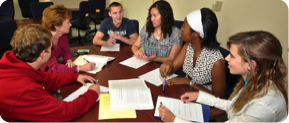WEb-Based Academic Support For Winthrop Psychology Majors

Advising, Course Selection, Registration
Reminders About What You Learned In PSYC 101
Reminders About What You Learned In PSYC 301/302
Internships and Service Learning
Writing Papers for Psychology Classes
Science and Pseudoscience In Psychology
Where to Find Credible Information on the Web
Oral Presentations in Psychology Classes
Resources For Undergraduate Research
Resources for Personal Productivity, Wellness, and Effectiveness
Employment Information for Psychology Majors
Professional Careers in Psychology
Marketing Yourself to Employers
Science and Pseudoscience in Psychology
• Wikipedia describes pseudoscience as "a methodology, belief, or practice that is claimed to be scientific or that is made to appear to be scientific, but which does not adhere to an appropriate scientific methodology, lacks supporting evidence or plausibility, or otherwise lacks scientific status." Read the full article with tips on recognizing pseudoscience at: http://en.wikipedia.org/wiki/Pseudoscience
• Is psychology a science? Before you dismiss the question with the quick response "Of course it is!," you might want to read this article: http://arachnoid.com/scientific_paradigm/index.html
• Science-Based Medicine is a blog which explores issues and controversies in science and medicine.
• Quackwatch.org: A reliable online source about quackery, health fraud, and unsupported products, services and theories. Related specialty sites include www.autism-watch.org and www.mentalhealthwatch.org.
• Skeptic's Dictionary: A review of the evidence base of numerous topics in junk science and pseudoscience, the Skeptic’sDictionary is an invaluable source.
• Research Autism. Many psychology students are interested in autism. Unfortunately, the web is often not a reliable source of information about this condition. One source that is reliable is Research Autism. Another reliable source is the advocacy group Autism Speaks.
• The National Standards Report from the National Autism Center is a "shopper's guide for autism treatment." It reviews scientific evidence for various treatments and rates them as established, emerging, unestablished or ineffiective/harmful.
• The Committee for Skeptical Inquiry promotes science and scientific inquiry, critical thinking, science education, and the use of reason in examining important issues. It encourages the critical investigation of controversial or extraordinary claims from a responsible, scientific point of view and disseminates factual information about the results of such inquiries to the scientific community, the media, and the public. The organization publishes The Skeptical Inquirer.
• The Field Guide to Critical Thinking by James Lett provides a framework for examining the evidence offered for any claim. It is especially helpful in examining claims that psychological treatments are "evidence based."
